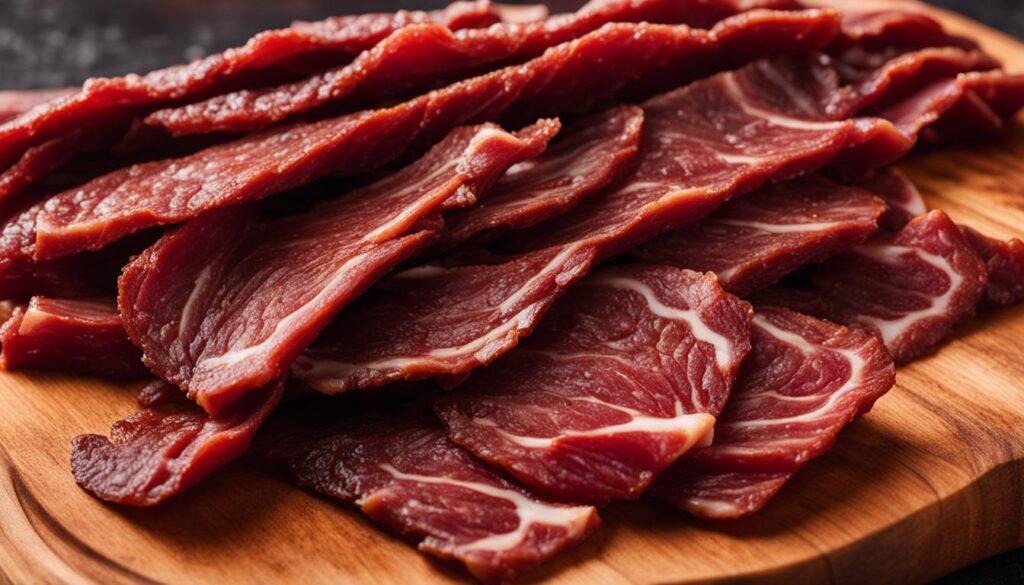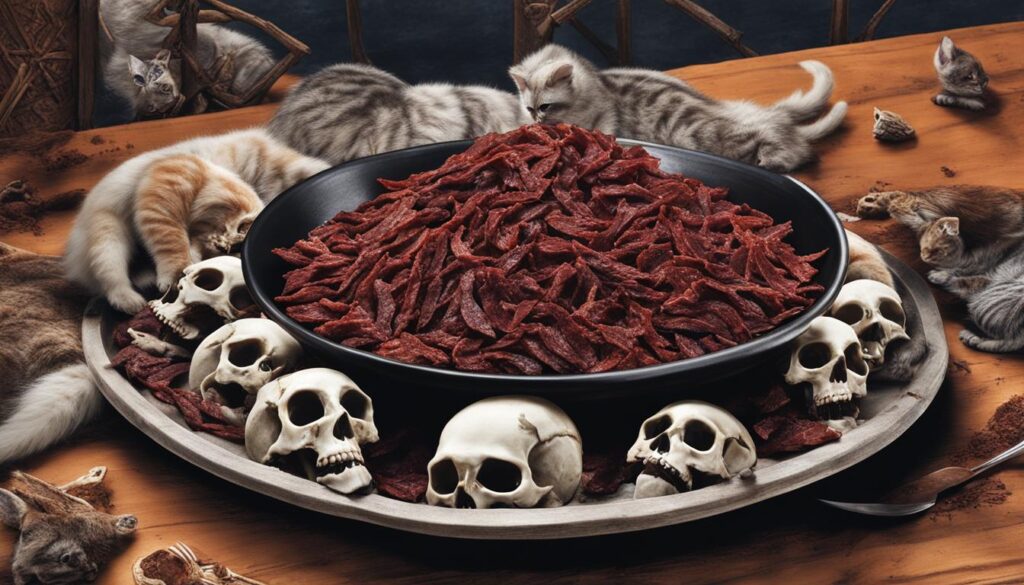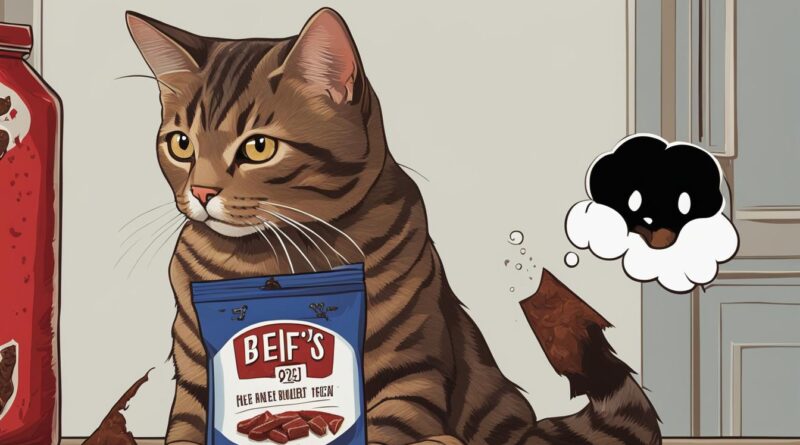Can Cats Eat Beef Jerky? Feline Diet Tips
Beef jerky is a delicious and popular snack among humans, but can we share this treat with our feline friends? As cat owners, we always want to ensure the health and safety of our beloved pets, especially when it comes to their diet. In this article, we will explore whether cats can eat beef jerky and provide valuable tips for maintaining a safe and healthy feline diet.
Key Takeaways:
- Feeding cats beef jerky can pose several risks and potential health issues
- Beef jerky contains high levels of sodium, which can lead to sodium poisoning in cats
- Preservatives and ingredients like hot peppers and garlic found in beef jerky can be toxic to felines
- The tough texture of beef jerky can be a choking hazard for cats
- It’s best to opt for safer alternatives like dried fish or commercial cat treats
What is Beef Jerky?
Beef jerky is a popular snack enjoyed by many, but have you ever wondered what exactly it is? Well, beef jerky is a portable and flavorful treat made from strips of meat. The meat is cured in a salt solution and then dried out, resulting in a chewy and savory snack.
This curing process is essential as it helps remove moisture from the meat, making it shelf-stable and perfect for on-the-go snacking. However, it’s important to note that most beef jerky available today is cured using high-sodium ingredients like Worcestershire sauce or soy sauce, enhancing the flavor but also increasing the sodium content.
Excessive sodium can be a cause for concern, not only for humans but also for our feline friends.

As shown in the image above, beef jerky typically contains high sodium content due to the curing process. This can be harmful to cats and may even lead to sodium poisoning, which can result in serious health issues.
Now that we understand what beef jerky is and how it is made, let’s dive deeper into why it’s important to avoid feeding beef jerky to our beloved cats.
Why Shouldn’t Your Cat Eat Beef Jerky?
Feeding beef jerky to your cat may seem harmless, but there are several reasons why it’s best to reconsider. This section explores the potential risks and health concerns associated with giving your feline friend this popular human snack.
The Dangers of Sodium Poisoning
Sodium poisoning is a serious concern when it comes to feeding cats beef jerky. This condition can occur when cats consume too much salt, leading to dehydration, imbalance in electrolytes, and other health complications. The high sodium content in beef jerky puts cats at risk of sodium poisoning, making it an unsafe choice for their diet.
Harmful Preservatives
Another reason to avoid feeding your cat beef jerky is the presence of preservatives, such as sodium nitrite. While these additives help prolong the shelf life of the snack, they can be harmful to cats. Ingesting preservatives like sodium nitrite can lead to digestive issues and other health problems in felines.
Toxic Ingredients in Hot Peppers and Garlic
Beef jerky often contains ingredients like hot peppers and garlic to enhance its flavor. However, these spices can be toxic to cats. Hot peppers can cause irritation and digestive discomfort, while garlic contains compounds that can lead to red blood cell damage in felines. It’s important to keep these ingredients away from your cat’s diet to prevent adverse reactions.
By avoiding beef jerky, you can protect your cat from the dangers of sodium poisoning, harmful preservatives, and toxic ingredients commonly found in this popular snack.

| Dangers of Feeding Your Cat Beef Jerky | |
|---|---|
| Sodium Poisoning | Preservatives |
| Can lead to dehydration and electrolyte imbalance | May cause digestive issues and other health problems |
| Toxic ingredients in hot peppers and garlic | |
| Can cause irritation and digestive discomfort |
Choking Hazard and Allergens
The tough, rubbery texture of beef jerky can pose a choking hazard for cats. Their inability to chew it thoroughly may lead to a piece getting stuck in their throat.
Furthermore, beef is a common allergen among cats, and consuming beef jerky can lead to allergic reactions such as itching, baldness, vomiting, and inflammation.
In addition to its texture, beef jerky contains allergens that can trigger adverse reactions in sensitive cats. These allergic responses can range from mild symptoms such as itching and bald patches to more severe cases of vomiting and inflammation.
Cats with beef allergies should avoid consuming beef jerky altogether to prevent these unpleasant reactions and potential health complications.
Exercise Caution When Feeding Your Cat
While it may be tempting to share your beef jerky with your cat, it’s important to exercise caution and consider the potential consequences. While small amounts of beef jerky may not immediately harm your cat, incorporating it into their regular diet can lead to serious health issues. Moderation is key when it comes to treating your feline friend.
Feeding your cat beef jerky as a treat may encourage unhealthy habits and contribute to weight gain, which can lead to a variety of cat health problems such as diabetes, heart disease, and joint issues. It’s crucial to prioritize your cat’s well-being by choosing cat treats that are specially formulated to meet their nutritional needs.
Commercial cat treats are often designed to provide necessary nutrients and are formulated to prevent overconsumption. These treats are made with feline health in mind and are a much safer option than sharing your own snacks. They come in a variety of flavors and textures that are sure to please your cat without compromising their health.
The Risks of Overindulging in Cat Treats
While cat treats can be a delicious source of joy for your furry friend, it’s essential not to overindulge. Feeding excessive amounts of treats can contribute to obesity, which puts cats at risk for serious health issues, including:
- Diabetes
- Heart disease
- Joint problems
It’s crucial to maintain a healthy balance and prioritize your cat’s overall well-being. Treats should only make up a small portion of their daily caloric intake to ensure they are receiving a balanced diet.
| Treat Type | Description | Portion Recommendation |
|---|---|---|
| Commercial Cat Treats | Specially formulated for feline health, these treats are designed to provide necessary nutrients without excessive calories. | 1-2 treats per day, depending on your cat’s size and dietary needs. |
| Alternative, Safer Options | Opt for natural treats such as freeze-dried chicken, turkey, or salmon. These options offer a high protein content and are less likely to contain harmful additives or fillers. | 1-2 small pieces per day, as part of a balanced diet. |
By following these recommendations and exercising moderation in treat-giving, you can ensure that your cat stays healthy and happy. Remember, the key to a cat’s well-being is maintaining a balanced diet that meets their specific nutritional needs.
An Alternative to Beef Jerky for Your Cat
If you’re looking for a safer and healthier meat-based treat for your cat, consider dried fish. Dried fish is a nutritious snack that provides essential protein and nutrients such as Omega-6 and Omega-3 fatty acids. It’s easier for cats to chew and can help improve their dental health by scraping their teeth while they eat.
By replacing beef jerky with dried fish, you can ensure that your cat receives the necessary nutrients for optimal health. Dried fish is rich in protein, which is crucial for muscle development and overall well-being in cats. Additionally, it contains a balanced ratio of Omega-6 and Omega-3 fatty acids, which are essential for healthy skin, coat, and immune system function. These fatty acids also have anti-inflammatory properties that can benefit cats with allergies or joint issues.
Furthermore, dried fish’s unique texture helps promote dental health for your cat. The chewing action required to consume dried fish can help remove plaque and tartar buildup on their teeth, reducing the risk of dental diseases such as gingivitis and periodontal disease. This natural teeth-cleaning effect can enhance your cat’s oral hygiene and contribute to their overall well-being.
When introducing dried fish as a treat for your cat, it’s important to choose a high-quality product specifically formulated for feline consumption. Look for dried fish treats that are made from pure fish without any additives or preservatives. It’s also crucial to moderate the portion size and incorporate dried fish into a balanced diet, alongside their regular cat food.
So, if you’re searching for a safer and more beneficial alternative to beef jerky, consider treating your cat to some delicious dried fish. Not only will it satisfy their cravings, but it will also provide them with essential protein, Omega-6 and Omega-3 fatty acids, and contribute to their dental health.
| Nutrients | Dried Fish |
|---|---|
| Protein | High |
| Omega-6 Fatty Acids | Present |
| Omega-3 Fatty Acids | Present |
| Dental Health Benefits | Yes |
Conclusion
In conclusion, it’s important to prioritize the health and well-being of your feline companions when considering their diet. While cats may be tempted by the taste of beef jerky, it’s best to avoid feeding it to them due to potential risks. Beef jerky contains ingredients that can be harmful to cats, including excessive sodium, preservatives, and allergens.
To ensure the cat’s health, it’s recommended to opt for safer alternatives such as dried fish or commercial cat treats. Dried fish provides essential protein and nutrients like Omega-6 and Omega-3 fatty acids, promoting their overall health. Additionally, it’s easier for cats to chew and can contribute to their dental health by scraping their teeth while they eat.
Remember, consulting with a veterinarian is crucial before introducing any new foods to your cat’s diet. They can provide personalized guidance and recommendations based on your cat’s specific needs, ensuring their health and safety. By making informed choices and prioritizing their well-being, you can provide your cat with a balanced and nutritious diet that supports their overall health and longevity.
FAQ
Can cats eat beef jerky?
No, it is not recommended to feed beef jerky to cats due to potential risks.
What is beef jerky?
Beef jerky is a portable snack made by curing strips of meat in a salt solution and drying it out.
Why shouldn’t your cat eat beef jerky?
Cats should not eat beef jerky because it can lead to sodium poisoning, contains harmful preservatives, and may have toxic ingredients like hot peppers and garlic.
Is beef jerky a choking hazard for cats?
Yes, the tough, rubbery texture of beef jerky can pose a choking hazard for cats.
Can beef jerky cause allergies in cats?
Yes, beef is a common allergen among cats, and consuming beef jerky can lead to allergic reactions.
Should I be cautious when feeding my cat?
Yes, it is important to exercise caution and avoid making beef jerky a regular part of your cat’s diet to prevent serious health issues.
What can be an alternative to beef jerky for cats?
Dried fish is a safer and healthier meat-based treat for cats, providing essential protein and nutrients like Omega-6 and Omega-3 fatty acids.
What is the conclusion regarding feeding cats beef jerky?
It is best to opt for safer alternatives like dried fish or commercial cat treats to ensure your cat’s health and well-being.


